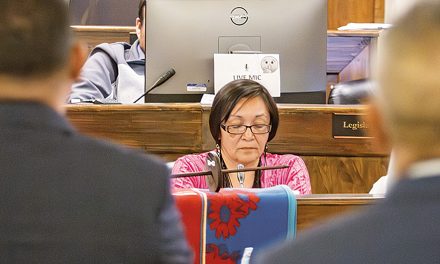
Delta variant still on the rise
TSÉBIGHÁHOODZÁNÍ
The Delta variant has run rampant through the U.S. in recent weeks, surpassing last summer’s peak of new daily cases and putting unvaccinated and people with weakened immune systems at risk.
While the COVID-19 vaccines are highly effective at preventing severe illness and death, it’s not clear how the Delta variant – the most dangerous and transmissible form of the coronavirus to date – has affected the likelihood of breakthrough infections.
Some people, such as the immunocompromised (whose bodies cannot learn to deploy immune fighters against the virus) and older adults, are at higher risk of breakthrough infections because they may have a lower immune response after vaccination.
Public health experts say people with breakthrough infections can carry as much coronavirus as unvaccinated people do.
The risk of the coronavirus spreading to vaccinated people also increases when many people gather close together for extended periods, especially when unvaccinated people are present.
“The unvaccinated ones are the ones we’re seeing in the hospital,” said Dr. Derek Feuquay, chief medical officer for Northern Arizona Healthcare. “They get hospitalized and end up getting some pretty bad lung infection and end up in the hospital for two weeks or longer.”
Mask indoors
The Centers for Disease Control and Prevention last month urged residents of high-transmission areas to wear masks in public indoor spaces, regardless of their vaccination status. This reverses the agency’s announcement in May that vaccinated people could go without masks.
“The CDC is recommending masks for all persons in indoor areas where COVID-19 numbers are high,” said Dr. John Mougin, physician executive of quality and safety for NAH. “This includes both vaccinated and unvaccinated individuals.
“It’s particularly important in public places, particularly in crowds or where you can’t distance” he said. “And we’re seeing high community spread currently.”
While mask-wearing has become a particularly divisive – and partisan – issue, public health experts say masks are necessary to slow the pandemic and it could prevent the need for lockdowns and cut economic losses.
“So, if you got COVID wearing the mask is the big deal,” Feuquay said. “And the problem you might run into is there could be plenty of people that are vaccinated that don’t know they have it. They could potentially be spreading it, especially the family members who aren’t vaccinated or too young to be vaccinated or even immunocompromised.”
Feuquay said as daily vaccination rates are slipping, persistent hesitancy about vaccines would keep the goal of reaching herd immunity out of reach.
But hopes for herd immunity is fading because new more contagious variants, such as the Mu variant, are spreading too easily and vaccinations aren’t happening quickly enough.
“We’re facing another wave of COVID-19 infections with the most recent outbreak of the Delta variant,” said Josh Tinkle, chief operating officer for NAH. “We do highly encourage anyone who is eligible to receive the COVID-19 vaccine. Please do so to help with severe illness and ultimately hospitalization.”
Dr. Anthony Fauci, President Joe Biden’s chief medical adviser for the pandemic, said as vaccinations climb, people need to start being more liberal concerning indoor mask-wearing.
Fauci said the country is still averaging about 43,000 cases of the virus daily.
“We need to get it much, much lower than that,” Biden said.
The battle over masks has also become contentious in some states with some leaders defying state bans.
COVID-19 variants
One of the newest variants of COVID-19 is the Mu, which has spread to nearly 50 countries, including the U.S., where the Delta variant is dominant, according to the Lineage Mutation Tracker.
But early studies suggest that the Mu variant is less easily transmitted than the Delta. The Mu became the dominant strain in Colombia where it was first detected in January.
The World Health Organization is monitoring Mu and has added it to the list of “variants of interest” because it has the potential to evade immunity provided by vaccines and antibodies.
“Unfortunately, COVID-19 infections have not gone away as we had hoped,” Mougin said. “As many of you are aware, we’re seeing a spike in cases with some very highly infectious variants.”
But the Delta is making up most COVID-19 cases not only at NAH hospitals but also at hospitals across the country, said Mougin.
“And early data suggests that the Delta variant of the virus is 200% to 250% more transmissible and may lead to much higher, up to 1,000 times higher viral loads than the previous COVID-19 (variants),” Mougin explained.
“What that means is that a single person with the Delta variant infection could infect as many as six to 10 others” he said. “This is compared to two to three others estimated with the original strain of COVID-19.”
Public health experts say the Delta variant is more transmissible than the viruses that cause MERS, SARS, Ebola, the common cold, the seasonal flu, and smallpox. It is contagious as chickenpox.
“This compares to chickenpox as far as the contagiousness of this new Delta variant,” Mougin said. “And we’re seeing that it’s particularly risk for unvaccinated individuals.
“Those who are unvaccinated, who are infected with the Delta variant have an 85% higher risk of requiring hospitalization compared to those who have received a full course of COVID-19 vaccination,” he said.
“So, it’s important to note that a vaccinated person can still become infected, and those vaccinated individuals may have few – or no symptoms – when they become infected,” he said. “That can lead to spreading the virus to others. That being said, the vaccine is doing its job.”
COVID-19 vaccines
The COVID-19 vaccines are doing their job, said Mougin. Immunizations are keeping most vaccinated people out of the hospital.
While the vaccines don’t protect against infection as they do against severe disease, the vaccines are keeping people off ventilators and from dying.
“We’ve seen a hugely reduced, severe infections, hospitalizations, and deaths amongst the vaccinated population – both nationally and locally,” Mougin said. “And this is really how the surge is different this time around.
“Improving COVID-19 vaccination rates is the most important thing we can do to protect our communities and ourselves,” he said.
Feuquay said youngsters 12 and up can get vaccinated.
Feuquay said NAH hospitals are seeing a big age range in COVID patients.
“Younger this time,” he said, “but I think that’s because of a very large percentage of the older population got vaccinated and the patients that I’ve seen that have been vaccinated, and still tested positive that were symptomatic were older.”
NAH hospitals are also still seeing patients from the nearby Native nations.
“I will say, they did a fantastic job of getting vaccinated,” Feuquay added. “The health care system out there did a wonderful job getting people vaccinated.
“While we’re seeing people from the reservation,” he added, “it’s not nearly in the numbers percentagewise that they saw early in the pandemic. So, it’s much better now. And kudos to those communities.”
As a public service, the Navajo Times is making all coverage of the coronavirus pandemic fully available on its website. Please support the Times by subscribing.
How to protect yourself and others.
Why masks work. Which masks are best.
Resources for coronavirus assistance








 Highway 264,
Highway 264, I-40, WB @ Winslow
I-40, WB @ Winslow